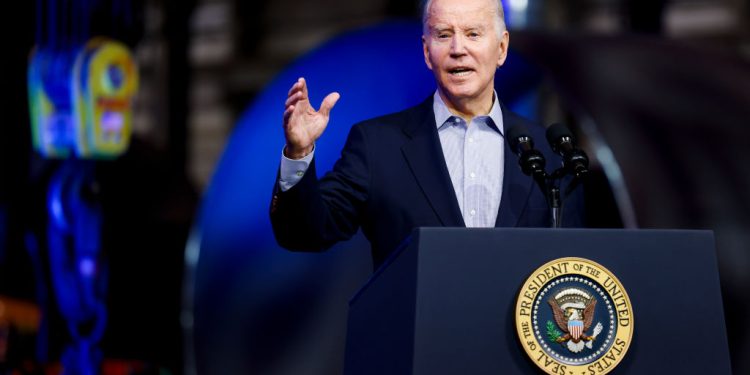The Biden administration issued a new rule Saturday that it claimed would both fight climate change and improve the U.S. economy, despite arguments — some from within President Joe Biden’s own party — that the rule would do neither.
The rule targets methane emissions from U.S. oil and natural gas producers, which the Environmental Protection Agency claimed in a statement was responsible for “approximately one third of the warming from greenhouse gases occurring today.”
“EPA’s final rule leverages the latest cost-effective, innovative technologies and proven solutions to prevent an estimated 58 million tons of methane emissions from 2024 to 2038, the equivalent of 1.5 billion metric tons of carbon dioxide – nearly as much as all the carbon dioxide emitted by the power sector in 2021,” the statement claimed.
“Sharp cuts in methane emissions are among the most critical actions the United States can take in the short term to slow the rate of climate change,” according to the statement.
In addition to methane, the rule also looks to reduce pollution from toxic byproducts of fossil fuel production and “volatile organic compounds” that can contribute to smog and therefore worsen breathing ailments such as asthma among the American people.
The statement also claimed that “low-income communities and communities with large numbers of people of color” were effected more than others by climate change, and therefore this rule would disproportionately benefit them.
Among other initiatives, the new rule looks to reduce or eliminate natural gas “flaring” in new oil wells, put more stringent standards in place for some equipment used in the industry, and add “comprehensive monitoring” requirements to those already mandated for oil and gas companies.
“On day one, President Biden restored America’s critical role as the global leader in confronting climate change, and today we’ve backed up that commitment with strong action, significantly slashing methane emissions and other air pollutants that endanger communities,” EPA Administrator Michael S. Regan was quoted as saying in the statement.
“Under President Biden and Vice President Harris’s leadership, the U.S is turbocharging the speed and scale of climate action, at home and abroad, including our collective efforts to tackle super-pollutants like methane,” added Ali Zaidi, an adviser to Biden on climate issues.
Not everyone agrees about the desirability of the new rule, however, including the chairman of the Senate Energy and Natural Resources Committee, Sen. Joe Manchin.
The West Virginia Democrat sent a letter to Regan in October arguing that the administration was moving too quickly under Biden to make changes to the oil and gas industry without fully understanding their impacts.
“The current Administration has made its intentions clear: it is determined to target our flourishing oil and gas sector, despite its substantial progress in reducing methane emissions, irrespective of how it might impact American energy security, reliability, and consumer cost,” Manchin wrote in the October 26 letter. “This has put pressure on EPA to hastily finalize and implement these extensive new regulations, leading to proposals that lack thorough consideration and alignment.”
Manchin argued that the EPA’s new rules would not only endanger America’s energy security and economic prosperity, but also be counterproductive to the organization’s own goals.
“This lack of alignment unjustly burdens industry while simultaneously hindering EPA’s ability to achieve its own stated emissions reduction objectives,” he wrote. “Because EPA is so singularly focused on its anti-fossil agenda, it has missed an opportunity to craft calibrated proposals that achieve emissions reductions while ensuring that the domestic oil and natural gas industry can continue to provide affordable and dependable energy to meet global market demands.
“While the federal government has a role in responsibly regulating methane emissions,” Manchin warned in the letter, “a failure to harmonize these rules before they are finalized will have severe consequences for the nation and our strategic partners, putting our energy and national security at risk.”
In addition to Manchin’s protest, House Republicans, perhaps more predictably, also wrote to Regan recently, arguing that in an inflationary environment exacerbated by supply chains still recovering from the disruption caused by pandemic-era lockdowns, the new rule could cause some companies to shut their doors.
“The scope, timeline, and legal durability of the EPA’s regulatory actions are unclear, and several of the questions in our June 2023 letter remain unanswered,” House Energy and Commerce Committee Chair Cathy McMorris Rodgers and Environment, Manufacturing, and Critical Materials Subcommittee Chair Bill Johnson wrote in their November 7 letter.
“What is known is that thousands of American jobs and billions of dollars in local economic development could be impacted by the EPA’s actions,” they added. “Global supply chains remain disrupted, and record inflation has increased prices for equipment and services across the energy sector.
“If the EPA’s scope and compliance timelines do not account for these realities, it could force energy producers to shut in existing production and lay off workers,” the letter warned. “We are concerned that small businesses and independent energy producers, who are significant contributors to local economies, could suffer the most.”
This article appeared originally on The Western Journal.


























 Continue with Google
Continue with Google